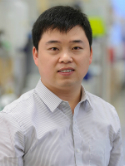Organoid development in cancer genome discovery Journal Article
| Authors: | Gao, D.; Chen, Y. |
| Article Title: | Organoid development in cancer genome discovery |
| Abstract: | The tumor response to most therapeutic agents in cancer is highly unpredictable. Cancer models which can adequately represent tumor heterogeneity and predict in vivo drug sensitivity are intense areas of investigation. Cancer cell lines and patient-derived xenograft models are the most frequently used models in cancer research and anticancer drug screening. Recently, cancer 'organoid' culture conditions have been developed to establish in vitro growth of patient-derived samples at higher efficiency and they are very promising for large scale drug screening and fundamental cancer biology research. Here, we leverage our experience in prostate cancer to discuss the advantages and limitations of these cancer models and summarize the development of cancer organoid culture-a development which may provide a new path towards personalized medicine in the future. © 2015 Elsevier Ltd. |
| Keywords: | signal transduction; treatment response; gene deletion; review; nonhuman; cancer cell culture; high throughput screening; tumor xenograft; cell heterogeneity; prostate cancer; cancer genetics; cell culture; cytoplasm; culture technique; personalized medicine; human; priority journal; prostate cancer cell line; benign organoid culture; cancer organoid culture; conditional reprogrammed cell; patient derived xenograft |
| Journal Title: | Current Opinion in Genetics and Development |
| Volume: | 30 |
| ISSN: | 0959-437X |
| Publisher: | Elsevier Inc. |
| Date Published: | 2015-02-01 |
| Start Page: | 42 |
| End Page: | 48 |
| Language: | English |
| DOI: | 10.1016/j.gde.2015.02.007 |
| PROVIDER: | scopus |
| PMCID: | PMC4476933 |
| PUBMED: | 25796043 |
| DOI/URL: | |
| Notes: | Export Date: 3 August 2015 -- Source: Scopus |
Altmetric
Citation Impact
BMJ Impact Analytics
Related MSK Work





